In this corner of Mississippi, the hands of Parisian-influenced chefs dig into the harvest of “it’s-in-my-blood” farmers. This culinary crossroads is a product of the people who plant, produce and prepare the foods that come from farm to fork every day in Oxford.
THE FARM
A few miles in the deep green of Taylor, down a long gravel driveway, a house stands that serves as the home of a number of cows, peacocks, guineas, ducks, dogs, cats, chickens and a lady by the name of Libby Callicoat.
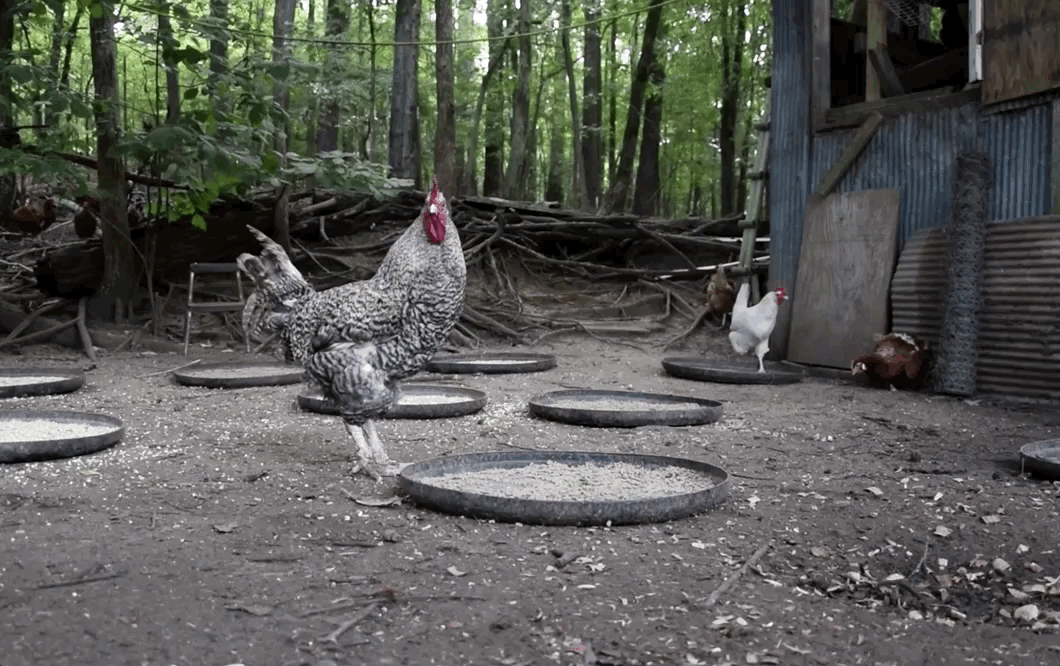
Callicoat is the mother of this dysfunctional family, dozens of chickens following her around the yard as she performs her daily chores and haphazardly calls their names, which are a combination of John Wayne characters and obscenities.
The owner of Pea Ridge Farms, Callicoat commercially sells eggs from her home, but she maintains she isn’t an organic farmer.
“I just farm the same way I’ve done my whole life,” she said. “It’s all natural, and it’s better for you. You can control what goes into the cow or tomato or chicken, and it’s just better.”
Local farms like Pea Ridge provide fresh produce to restaurants and citizens through farmers markets, and most can agree that the end result is healthier, tastier food, all while reinvesting in the local economy.
“A lot of the time after I sell eggs at Chicory Market or Canteen, I go straight to Dash for Cash and buy feed for the chickens,” she said.
But Callicoat’s main attraction to chicken farming is her love of the animals and “God’s nature.”
“I enjoy anything that I can be outside,” she said. “I don’t like to be in the house unless I absolutely have to.”
You can tell that Callicoat is telling the truth. Her arms are marbled with spots of darkly pigmented skin, and her light hair is tucked under a weathered baseball cap. Devotedly done, it’s clear that the work Callicoat does isn’t work at all, because she loves it. Her eyes shine when she talks about her chickens that trail after her.
“Chickens are just so interesting and funny to watch. They’ll just talk to you,” she said, as she begins clucking, mimicking them. “You’ve got to give these chickens a lot of attention if you want good product. I could spend several hours a day just tending to them.”
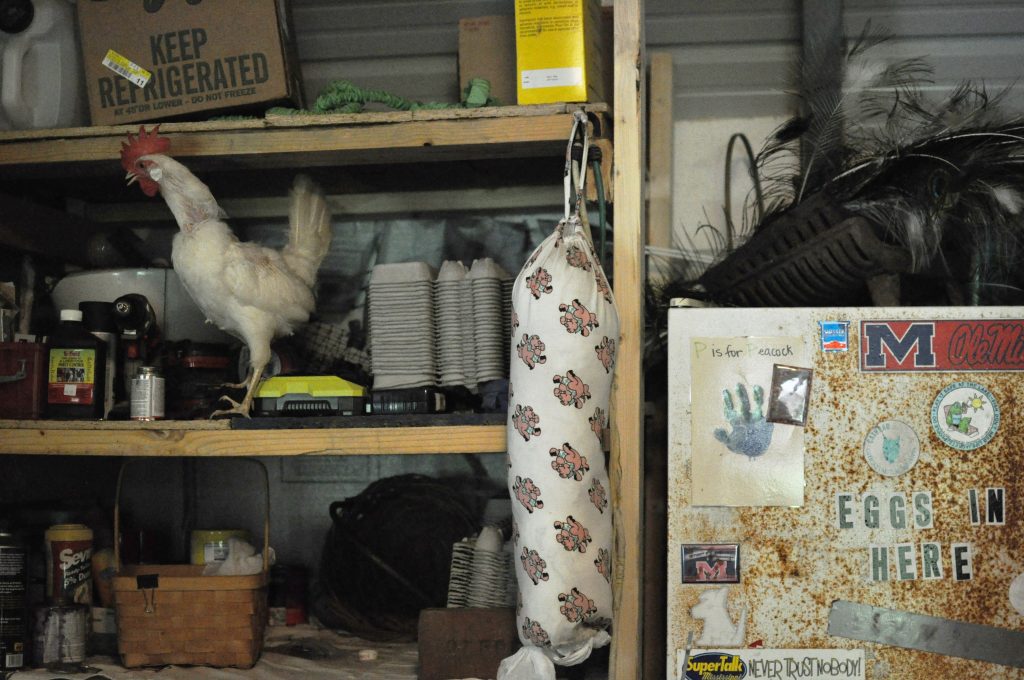
A chicken struts around Libby Callicoat’s garage. (Photo by Devna Bose)
According to Callicoat, the work she puts into them becomes clear with the end product. Apparently, a pan of cornbread made with her eggs will make “make you want to slap somebody,” and that’s enough reward for her.
THE MARKET
Executive chef of Snackbar and repeat James Beard award finalist Vishwesh Bhatt, known to most as Vish, is a regular patron of local farmers markets, including the one that crops up every Tuesday afternoon under the canopy of the Old Armory right off University Avenue. As he steps into the scene, his presence is somehow silently announced.
His hands are immediately clasped and shaken by other local chefs who have worked and collaborated alongside Bhatt, and he is embraced and acknowledged by Oxonians who have enjoyed his carefully-crafted food over the years. He scans the colorful tables before settling on some tomatoes he deems worthwhile, turning them over in his hands.
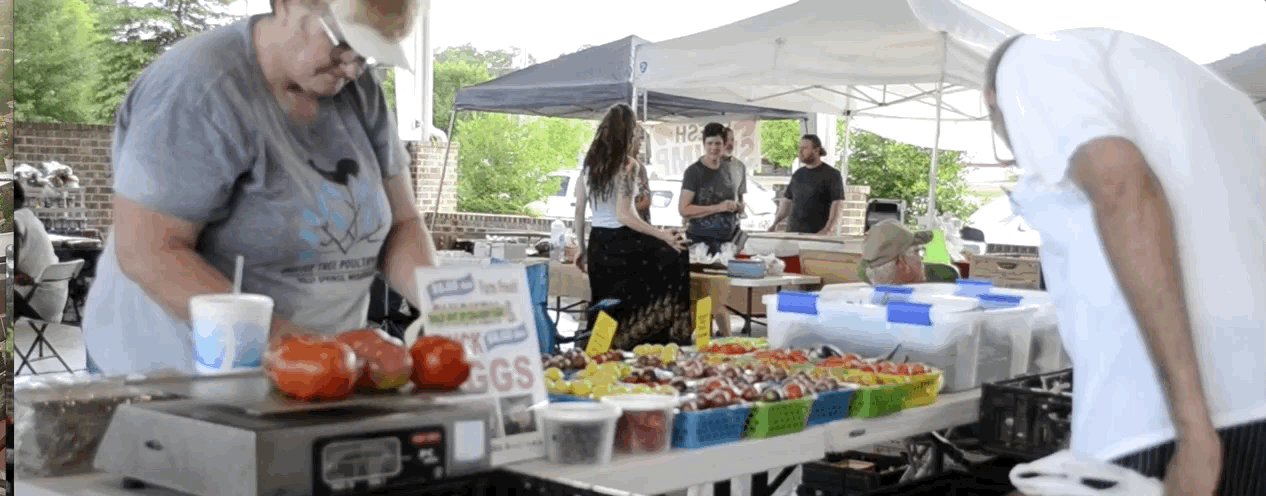
Bhatt fell into cooking as a means to buy beer in college, and after a while, he realized how much he enjoyed it. He’s been with Snackbar since its opening nearly ten years ago, and much of his locally-focused cooking style at the restaurant draws from his childhood in western India.
“It’s how I grew up eating. There were no big supermarkets – we didn’t get food wrapped up in plastic,” he said. “The produce guy would come where we lived, and what was growing in season was what was available. It’s how I grew up.”
Bhatt quickly realized the bittersweet joys of waiting for certain times of the year so that specific produce would be available.
“I learned very early, that it was fun to wait for things to be in season,” he said. “It’s not so exciting if you have it year round. To me, that’s important, so we do that here as much as we can.”
However, he explained that it’s not always easy to get what he’s looking for locally, especially working with a large menu. Bhatt starts the process by searching for produce in Oxford and then expanding into the rest of the state and region.
“That’s how I go about looking for what I want to put on the menu,” he said. “But I always look at local farms first.”
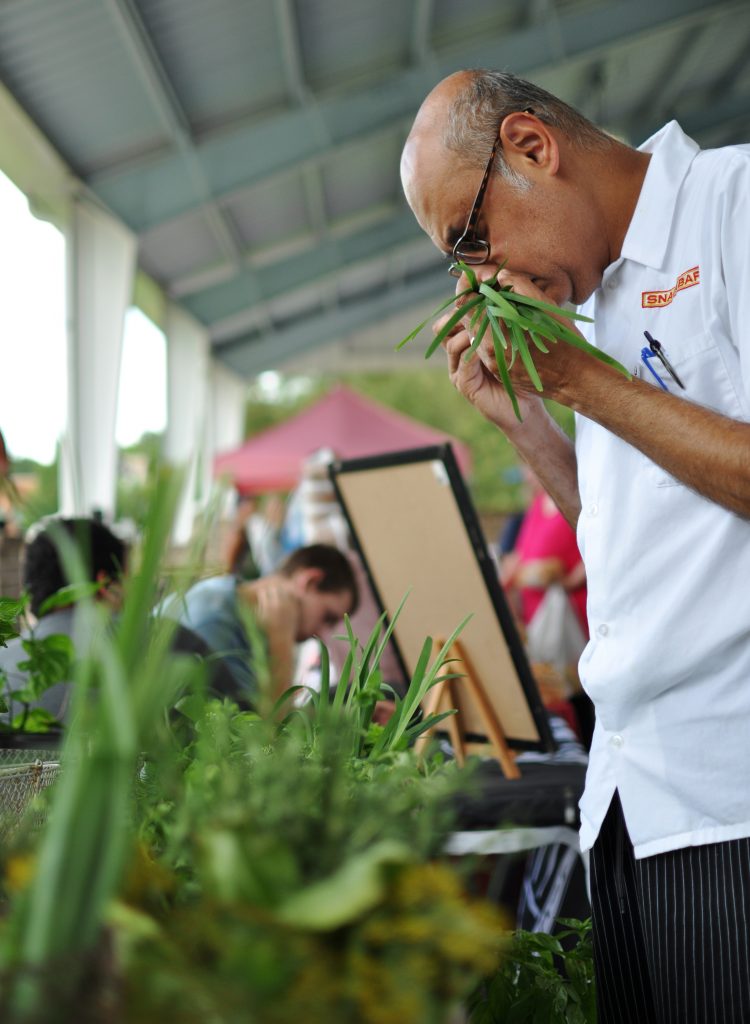
Executive chef of Snackbar Vishwesh Bhatt smells a fresh sprig of greens at the farmers market. (Photo by Devna Bose)
Though this culinary movement of sorts towards locally-sourced food has been successful in recent years, it hasn’t always been.
“For a long time, people would come to restaurants and wouldn’t want tomatoes and zucchinis because they could find that in their own garden,” he said. “We’ve worked hard to change that mentality. These foods that are a part of our culture and growing up are important. We need to pay attention to them.”
Bhatt picks up a sprig of greens, presses them to his nose and inhales deeply. He leaves the market, bags stuffed with spoils clenched in both of his hands.
THE PLATE
Chef and co-owner of Oxford Canteen Corbin Evans grabs an egg from a carton in the cooler Callicoat dropped off earlier that morning and cracks it swiftly over a hot, oiled pan. He sprinkles coarse salt and pepper on it while it sizzles in Canteen’s kitchen.
Evans has been doing this for a long time.
After a sports injury in college caused his mouth to be wired shut, he realized how much people took food for granted. He started working in restaurants, and after a while, someone suggested he go to culinary school. Ever since, he’s cooked all over the globe in cities like New Orleans, New York City and Paris, before settling in Oxford.
“[Culinary school] opened a lot of doors working with great chefs,” he said. “In the process, I worked with chefs who were proponents of ‘save the farm’ and all that, who emphasized how important local and seasonal produce is.”

Chef Corbin Evans fries fresh eggs in the Canteen kitchen. (Photo by Devna Bose)
Evans opened Canteen “at the window” in the alley next to the Lyric Oxford in April 2014 in hopes of using more local produce to create interesting dishes. The restaurant moved to North Lamar and opened its brick and mortar Canteen location in August of last year.
Melissa Booth Hall, managing director of the Southern Foodways Alliance, has noticed a boom in agricultural production focused specifically on food and claims it’s due in part to a rise in restaurants that value and promote a culture of using local food.
“I think in Oxford, it works because you have the right sort of mix,” she said. “I think it starts with having a restaurant culture, and knowing that in restaurants like Snackbar, Canteen, St. Leo, knowing you have customers you can depend on. What those restaurants tend to create is a group of consumers.”
Local and fresh isn’t a new style for Evans – it’s how he has always cooked.
“People say I have farmers market cuisine style,” he said. “The chefs I worked for really emphasized it. Generally, it’s cheaper, and the ripeness and shelf life is much better when you buy local.”
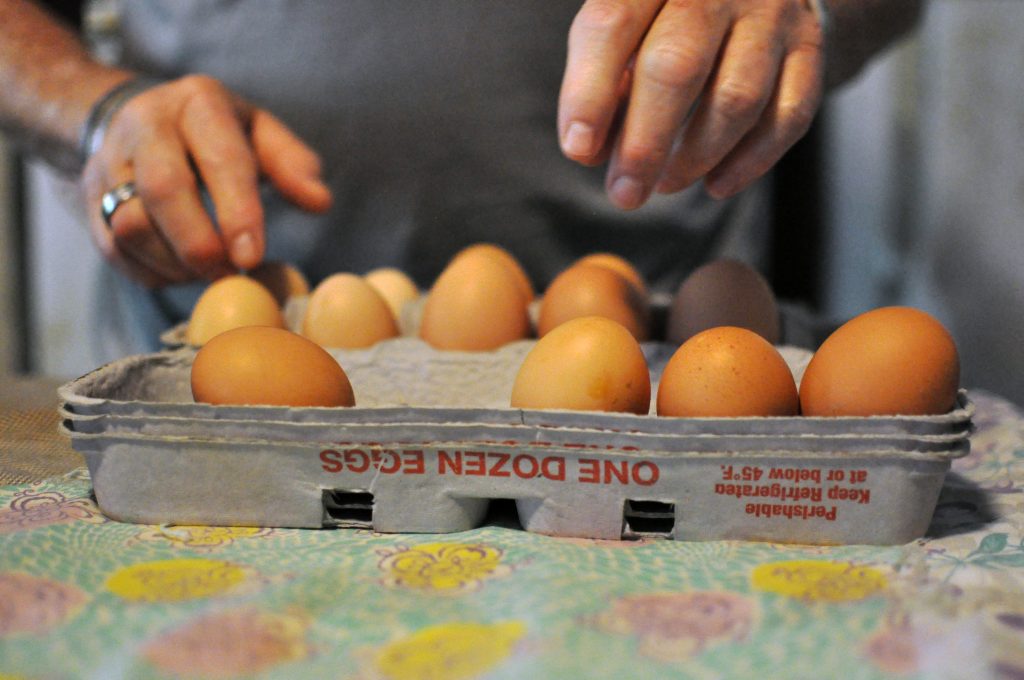
Libby Callicoat packs a carton full of fresh eggs. (Photo by Devna Bose)
Evans said much of his local emphasis has to do with trust and having a good relationship with the farmers on the other end of the process.
“When you buy something from down the street, you know the farmer and you trust them,” he said. “They’re going to have you their best product. They’re trying to support your business, too. I just feel like it’s the easiest way to cook.”
Hall agreed that a healthy relationship between markets and chefs is integral to the the dining experience.
“Once markets establish themselves, they start paying attention to what people want,” she said. “It’s not that [the movement] is new, but we’ve reached, I wouldn’t say a saturation point, but it’s a point where you couldn’t say it’s not happening anymore.”
By eating and buying local, everyone involved is investing in Oxford.
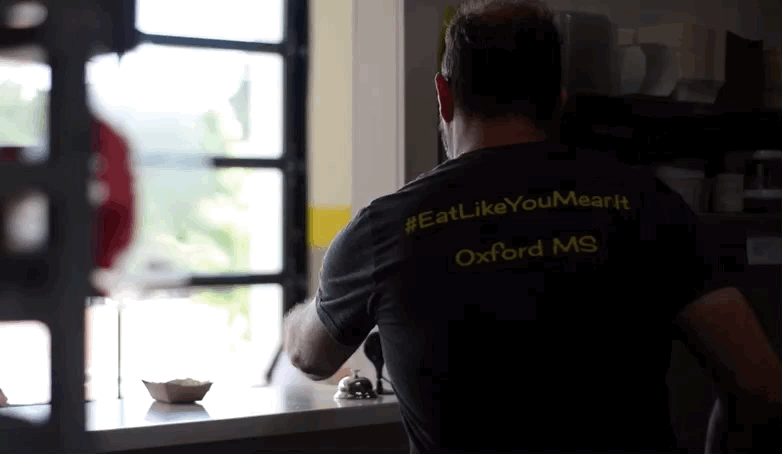
“With your fork, you can really make changes if you think about it,” Evans said. “If more people took it seriously, we’d all be healthier and we’d all be happier.”
Evans finishes up the eggs within minutes, places them on the counter, and Callicoat digs into the eggs from some of her very own John Wayne chickens.
“You can cook a damn good egg,” Callicoat hollers from the sun-soaked table in the middle of Canteen, before swooping in for another bite. Evans smiles.







